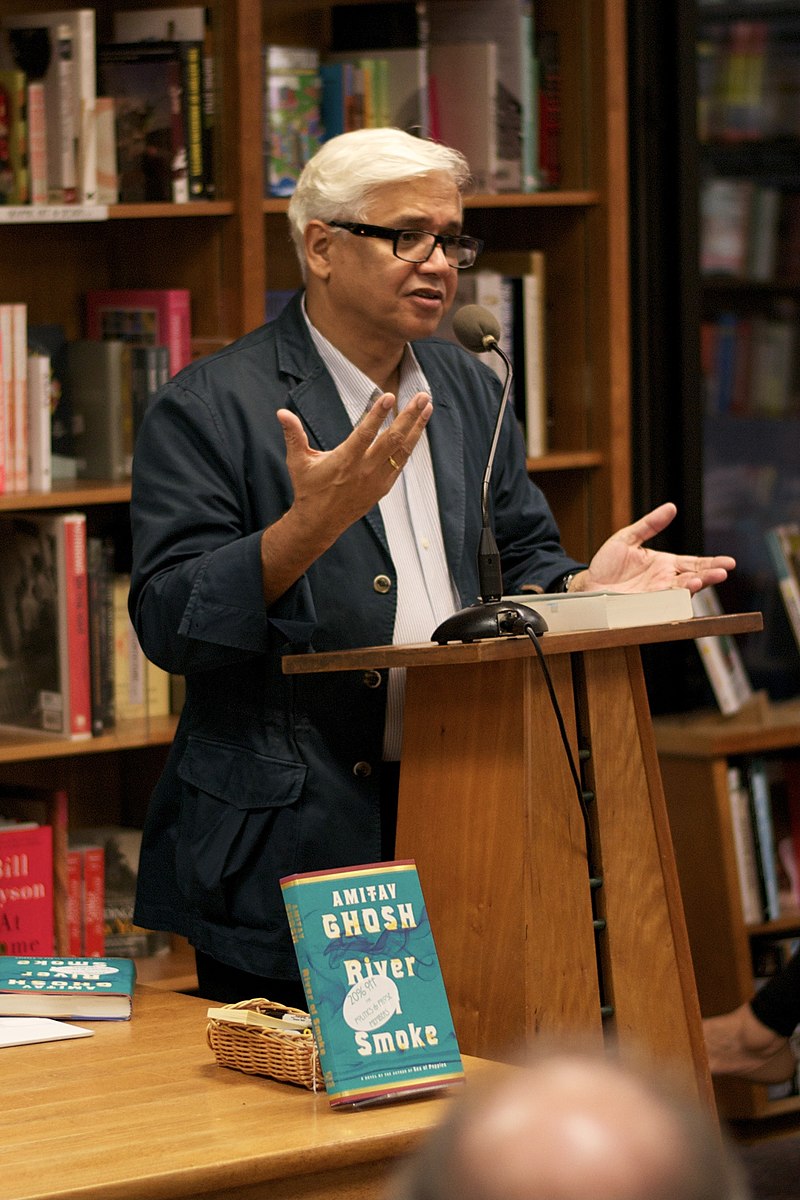Amitav Ghosh, an Indian English writer, specializes in historical fiction. His works often unfold against the backdrop of the Bay of Bengal, the Arabian Sea, and the Indian Ocean.
Born in Calcutta on July 11, 1956, Ghosh was educated at The Doon School in Dehradun, an all-boys boarding school. He grew up across India, Bangladesh, and Sri Lanka.
His companions at The Doon School included author Vikram Seth and historian Ram Guha. During his time at the school, Ghosh contributed fiction and poetry to The Doon School Weekly. He also co-founded the magazine History Times with Guha.
Following his schooling, he pursued degrees from St Stephen’s College, Delhi University, and the Delhi School of Economics. Subsequently, he completed a D.Phil. in social anthropology at St Edmund Hall, Oxford, under the supervision of British social anthropologist Peter Lienhardt.
His wife, Deborah Baker, is an author known for her biography of Laura Riding titled “In Extremis: The Life of Laura Riding” (1993) and holds a senior editor position at Little, Brown and Company. They share two children, named Lila and Nayan.
Ghosh’s literary works often employ intricate narrative structures to explore themes of national and personal identity, particularly focusing on the people of India and South Asia. His storytelling delves deeply into historical contexts, shedding light on pivotal moments and the cultural complexities within these regions.
“The Circle of Reason” (1986): His first novel The Circle of Reason and honored with the Prix Médicis Étranger (Foreign Medici Prize) in 1990, a prestigious French literary award recognizing outstanding works in foreign literature.
“The Shadow Lines” (1988): Divided into two segments, ‘Going Away’ and ‘Coming Home’ the novel traces the journey of a young boy as he matures in Calcutta, receives an education in Delhi, and later navigates through his experiences in London. The novel received two prestigious awards: Sahitya Akademi Award in 1989 and Ananda Puraskar. In 1998, Shalini Topiwala translated the novel into Gujarati.
“The Calcutta Chromosome” (1995): Combining science fiction and historical mystery, this book revolves around the search for the truth behind the disappearance of a scientist involved in malaria research. The novel loose based on the life and achievements of Sir Ronald Ross; the Nobel Prize-winning scientist known for his groundbreaking malaria research in 1898. This work received the Arthur C. Clarke Award in 1997, acknowledging its literary merit and contribution to the science fiction genre.
“The Glass Palace” (2000): Spanning Burma, India, and Malaya, this epic novel traverses generations and continents, focusing on characters whose lives intertwine amidst historical events like the British colonization of Burma. The Glass Palace was translated into over 25 languages. The novel secured the “Best Book” category of the 2001 Commonwealth Writers’ Prize. Interestingly, Ghosh decided to withdraw from the competition.
“The Hungry Tide” (2004): Set in the Sundarbans, it portrays the intersecting lives of an American cetologist, an Indian-American translator, and a fisherman. The narrative is deeply intertwined with the ecosystem of the region. It won the 2004 Hutch Crossword Book Award for Fiction.
“Ibis trilogy”: Between 2004 and 2015, Ghosh dedicated himself to crafting the Ibis trilogy, set in the 1830s, focusing on the buildup and consequences of the First Opium War across China and the Indian Ocean region. This trilogy comprises “Sea of Poppies” (2008), “River of Smoke” (2011), and “Flood of Fire” (2015).
“Gun Island” (2019): This novel is a contemporary tale that melds mythology, environmental concerns, and migrations. It follows the journey of a rare book dealer exploring the Sunderbans and the story of a mythological gun merchant.
“Jungle Nama” (2021): Ghosh’s first venture into verse, this book explores the legend of Bon Bibi in the Sundarbans, a tale intertwined with the region’s mythology and ecological concerns.
In addition to his historical fiction, Ghosh has ventured into non-fiction, addressing significant subjects like colonialism and climate change. His non-fiction works offer insightful perspectives on the impact of colonial legacies and the pressing concerns of environmental change, reflecting his commitment to exploring multifaceted issues that resonate globally while rooted in regional contexts.
“In an Antique Land” (1992): This book intertwines history, travel, and anthropology, exploring connections between 12th-century Egypt and contemporary India through the lens of Ghosh’s experiences.
“Dancing in Cambodia and at Large in Burma” (1998): Ghosh’s collection of essays offers insights into Cambodia’s cultural revival and the political landscape of Burma.
“Countdown” (1999): An exploration of the complexities and challenges faced during the production of a film in India.
“The Imam and the Indian” (2002): A collection of essays encompassing themes like fundamentalism, the history of the novel, Egyptian culture, and literature.
“The Great Derangement: Climate Change and the Unthinkable” (2016): Ghosh examines the failure of modern literature and art to adequately engage with the urgent issue of climate change.
“The Nutmeg’s Curse: Parables for a Planet in Crisis” (2021): This work uses the journey of nutmeg from its native Banda Islands as a lens to understand the historical impact of colonialism on attitudes toward Indigenous cultures and environmental change.
“Smoke and Ashes: A Writer’s Journey Through Opium’s Hidden Histories” (2023): Ghosh presents his research on the history of opium, delving into the background behind the First Opium War, which also serves as the backdrop to his Ibis Trilogy (2008–2012).
Amitav Ghosh has received numerous accolades, including two Lifetime Achievement awards, and four honorary doctorates:
- In 2007 he won the Padma Shri award from the President of India.
- In 2010, he shared the Dan David prize with Margaret Atwood and was honored with the Grand Prix of the Blue Metropolis festival in Montreal in 2011, marking him as the first English-language writer to receive this award.
- In 2018 his achievements also included winning the 54th Jnanpith Award, India’s highest literary honor.
- In 2019 he was recognized as one of the most important global thinkers of the preceding decade by Foreign Policy magazine.
